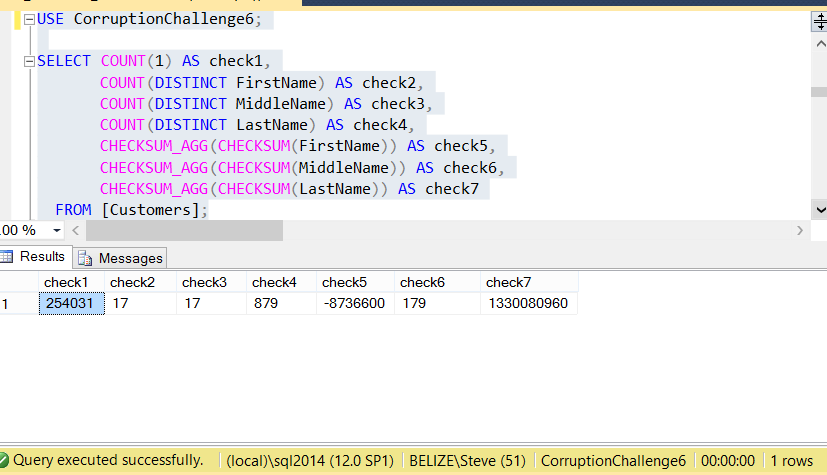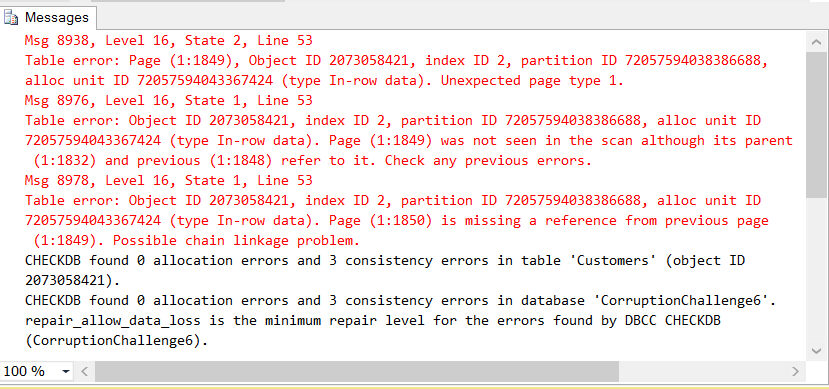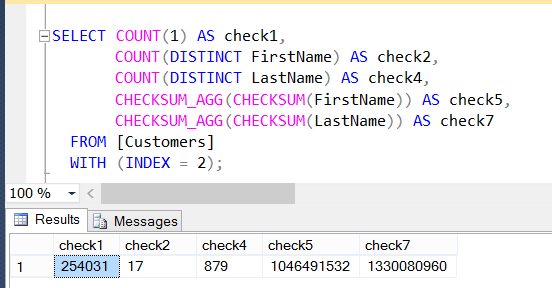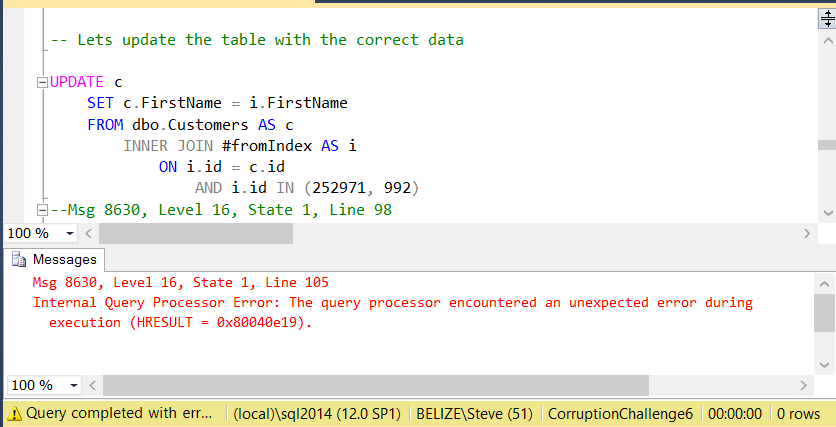If you are looking for more info on the corrupt database with Week 6 of the Database Corruption Challenge, you can take a look at the original post.
Week 6 was won by Raul Gonzalez who submitted his winning solution just 45 minutes after the challenge began. Raul has solved 4 of the 6 challenges so far, and has scored 2 extra points for linking to the challenge, and commenting on the CheckDB post.
The solution this week was in the non-clustered index, and there was some corruption in the clustered index. If you were to just drop and recreate the non-clustered index, the corruption in the clustered index was not able to be found. Comparing the values in the non-clustered index to the clustered index show where the corruption exists.
Lets take a look at his solution. The only thing I changes was the directory paths on the restore to match my configuration.
USE master
GO
IF DB_ID('CorruptionChallenge6') IS NOT NULL BEGIN
ALTER DATABASE CorruptionChallenge6 SET SINGLE_USER WITH ROLLBACK IMMEDIATE
DROP DATABASE CorruptionChallenge6
END
GO
IF OBJECT_ID('tempdb..#fromIndex') IS NOT NULL DROP TABLE #fromIndex
IF OBJECT_ID('tempdb..#fromTable') IS NOT NULL DROP TABLE #fromTable
IF OBJECT_ID('tempdb..#goodData') IS NOT NULL DROP TABLE #goodData
RESTORE FILELISTONLY
FROM DISK = 'C:\DBBackups\CorruptionChallenge6.bak'
GO
RESTORE DATABASE CorruptionChallenge6
FROM DISK = 'C:\DBBackups\CorruptionChallenge6.bak'
WITH NORECOVERY, REPLACE
, MOVE 'CorruptionChallenge6' TO 'C:\SQL_DATA\CorruptionChallenge6.mdf'
, MOVE 'CorruptionChallenge6_log' TO 'C:\SQL_DATA\CorruptionChallenge6_log.ldf'
GO
RESTORE DATABASE CorruptionChallenge6 WITH RECOVERY
GO
-- Custom SP EXECUTE DBA.dbo.DBA_tableDescription 'CorruptionChallenge6', NULL, NULL, NULL, 1 GO --databaseName schemaName tableName tableType row_count TotalSpaceMB DataSpaceMB IndexSpaceMB UnusedSpaceMB LastUserAccess TotalUserAccess TableTriggers TableDescription --CorruptionChallenge6 dbo Customers CLUSTERED 254031 8.227 8.188 0.039 0.030 -- Custom SP EXECUTE DBA.dbo.DBA_indexDescription 'CorruptionChallenge6' GO --dbname tableName index_name index_type filegroup_desc is_primary_key row_count size_MB fill_factor reserved_MB data_compression_desc user_seeks user_scans user_lookups user_updates index_columns included_columns filter --[CorruptionChallenge6] [dbo].[Customers] PK_Customers CLUSTERED PRIMARY Yes 254031 8.23 0 8.26 NONE NULL NULL NULL NULL [id] ASC NULL NULL --[CorruptionChallenge6] [dbo].[Customers] ncFName NONCLUSTERED PRIMARY No 254031 6.88 0 7.52 NONE NULL NULL NULL NULL [FirstName] ASC (NULL), [LastName] ASC (NULL) NULL NULL USE CorruptionChallenge6; SELECT COUNT(1) AS check1, COUNT(DISTINCT FirstName) AS check2, COUNT(DISTINCT MiddleName) AS check3, COUNT(DISTINCT LastName) AS check4, CHECKSUM_AGG(CHECKSUM(FirstName)) AS check5, CHECKSUM_AGG(CHECKSUM(MiddleName)) AS check6, CHECKSUM_AGG(CHECKSUM(LastName)) AS check7 FROM [Customers]; --check1 check2 check3 check4 check5 check6 check7 --254031 17 17 879 -8736600 179 1330080960
DBCC CHECKDB('CorruptionChallenge6') WITH NO_INFOMSGS
--Msg 8938, Level 16, State 2, Line 49
--Table error: Page (1:1849), Object ID 2073058421, index ID 2, partition ID 72057594038386688, alloc unit ID 72057594043367424 (type In-row data). Unexpected page type 1.
--Msg 8976, Level 16, State 1, Line 49
--Table error: Object ID 2073058421, index ID 2, partition ID 72057594038386688, alloc unit ID 72057594043367424 (type In-row data). Page (1:1849) was not seen in the scan although its parent (1:1832) and previous (1:1848) refer to it. Check any previous errors.
--Msg 8978, Level 16, State 1, Line 49
--Table error: Object ID 2073058421, index ID 2, partition ID 72057594038386688, alloc unit ID 72057594043367424 (type In-row data). Page (1:1850) is missing a reference from previous page (1:1849). Possible chain linkage problem.
USE CorruptionChallenge6 SELECT COUNT(1) AS check1, COUNT(DISTINCT FirstName) AS check2, COUNT(DISTINCT LastName) AS check4, CHECKSUM_AGG(CHECKSUM(FirstName)) AS check5, CHECKSUM_AGG(CHECKSUM(LastName)) AS check7 FROM [Customers] WITH (INDEX = 2); --check1 check2 check4 check5 check7 --254031 17 879 1046491532 1330080960 -- same same same different same
SELECT c.id, FirstName, LastName, CHECKSUM(c.id, c.FirstName, c.LastName) AS rowCheckSum INTO #fromIndex FROM [Customers] AS c WITH (INDEX = 2) -- 254031 SELECT c.id, FirstName, LastName, CHECKSUM(c.id, c.FirstName, c.LastName) AS rowCheckSum INTO #fromTable FROM [Customers] AS c WITH (INDEX = 1) -- 254031 SELECT * FROM #fromIndex AS i INNER JOIN #fromTable AS t ON t.id = i.id AND t.rowCheckSum = i.rowCheckSum -- 254029 SELECT * FROM #fromIndex AS i INNER JOIN #fromTable AS t ON t.id = i.id AND t.rowCheckSum <> i.rowCheckSum -- and the 2 different to make 254031 --id FirstName LastName rowCheckSum id FirstName LastName rowCheckSum --252971 Mia MULLEN -915392973 252971 €ea MULLEN -875026817 --992 Alexander FISCHER 1976501021 992 Aliwander FISCHER 1724842269
-- So index look correct and table not. -- Lets update the table with the correct data UPDATE c SET c.FirstName = i.FirstName FROM dbo.Customers AS c INNER JOIN #fromIndex AS i ON i.id = c.id AND i.id IN (252971, 992) --Msg 8630, Level 16, State 1, Line 98 --Internal Query Processor Error: The query processor encountered an unexpected error during execution (HRESULT = 0x80040e19). -- wow :)
-- Get all good data in a temp table
SELECT c.id, i.FirstName, c.MiddleName, i.LastName
INTO #goodData
FROM dbo.Customers AS c
INNER JOIN #fromIndex AS i
ON i.id = c.id
TRUNCATE TABLE dbo.Customers
DBCC CHECKDB('CorruptionChallenge6') WITH NO_INFOMSGS
-- No corruption
SET IDENTITY_INSERT dbo.Customers ON
INSERT INTO dbo.Customers (id, FirstName, MiddleName, LastName)
SELECT id, FirstName, MiddleName, LastName
FROM #goodData
SET IDENTITY_INSERT dbo.Customers OFF
-- final check
SELECT COUNT(1) AS check1,
COUNT(DISTINCT FirstName) AS check2,
COUNT(DISTINCT MiddleName) AS check3,
COUNT(DISTINCT LastName) AS check4,
CHECKSUM_AGG(CHECKSUM(FirstName)) AS check5,
CHECKSUM_AGG(CHECKSUM(MiddleName)) AS check6,
CHECKSUM_AGG(CHECKSUM(LastName)) AS check7
FROM [Customers];
--check1 check2 check3 check4 check5 check6 check7
--254031 17 17 879 1046491532 179 1330080960
SELECT @@VERSION
-- Microsoft SQL Server 2014 - 12.0.2000.8 (X64)
-- Feb 20 2014 20:04:26
-- Copyright (c) Microsoft Corporation
-- Developer Edition (64-bit) on Windows NT 6.1 <X64> (Build 7601: Service Pack 1)
-- Clean up
IF OBJECT_ID('tempdb..#fromIndex') IS NOT NULL DROP TABLE #fromIndex
IF OBJECT_ID('tempdb..#fromTable') IS NOT NULL DROP TABLE #fromTable
IF OBJECT_ID('tempdb..#goodData') IS NOT NULL DROP TABLE #goodData
And that is how Raul Gonzalez won this weeks Database Corruption Challenge.
Awesome work Raul.
More from Stedman Solutions:

Steve and the team at Stedman Solutions are here for all your SQL Server needs.
Contact us today for your free 30 minute consultation..
We are ready to help!






Hi,
How would you have even known to go down this path?
What I mean is, since the corruption pointed at index id = 2, it appears the easy answer is to drop / recreate that index. After doing that CHECKDB comes back clean.
Great series, by the way, I’m learning a bunch.
Yes dropping and recreating the index would have removed all the corruption that CheckDB could see, however there was additional corruption in the clustered index that comparing the data exposed.
As far as knowing how to go down this path… lots of experience with corruption, and figuring out what is bad.
Glad you are enjoying the series.
-Steve Stedman